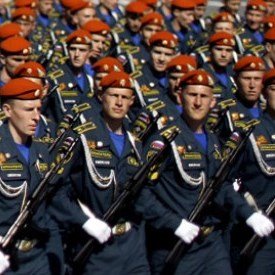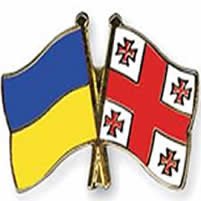Last week, I was once again in attendance at the Russian MOD's Moscow Conference on International Security (MCIS). As I did last year, over the next couple of weeks I'll write up some of the key speeches and then conclude with some takeaway thoughts on the event.
The Russian speakers at the plenary session included Defense Minister Sergei Shoigu, Foreign Minister Sergei Lavrov, and Chief of the General Staff Valery Gerasimov. Security Council Secretary Nikolay Patrushev delivered greetings from Vladimir Putin. So pretty much the same lineup as last year, with the addition of Patrushev. The links above go to video of the speeches, with Russian language audio. Texts of the speeches have also been posted: Shoigu, Lavrov, Gerasimov, Patrushev.
For those who don't understand Russian, here are some highlights of the speeches:
First up, the greeting from Vladimir Putin, as read by Nikolay Patrushev. The greeting highlighted the significance of holding the conference just before the 70th anniversary of the end of World War II, noting that it is a reminder that history cannot be forgotten and of the threats presented by the glorification of Nazism, the encouragement of xenophobia and extremism, and pretensions of any country to world domination. The speech also noted that the current system of international security was developed collectively in the aftermath of the second World War on the basis of mutual interests and partnership. Any distancing from these rules leads to one-sided and non-workable efforts to resolve global threats. Furthermore, crude interference in any country's internal affairs through scenarios such as "color revolutions" just increases the space where violence and chaos are rampant. The rise of the Islamic State highlights the rapid growth and global spread of extremism and terrorism that no single country or grouping of states can defeat. Coordinated action by the entire global community, based on international law, is the only way to address this threat.
Sergei Shoigu gave the first substantive speech, expanding on the themes in Putin's greeting. He highlighting the leading role played by the Soviet Union in defeating Nazism, while noting the contributions of all countries that participating in the fight. He then transitioned to the need for the world to unite to fight the rebirth of fascism, xenophobia, racism and militarism and to tie Russia's perceptions of the current international situation to the fight against Nazism. Specifically, he focused on the threat posed by "countries that consider themselves winners of the Cold War and want to force their will on others" to the stability of the international system that was created after World War II. He warned against unilateralism in international affairs and against efforts by any one country to develop absolute military superiority.
He then returned to the previous year's theme of the threat posed to the world by color revolutions, noting events over the last year in Hong Kong and Venezuela as continuing the effort by the United States and its allies to sow chaos in states that oppose US policies. He then turned to Ukraine, calling it the greatest tragedy caused by the color revolutions policy. He said that in its efforts to make Ukraine into its satellite, the US had crossed all conceivable lines in promoting an anti-constitutional overthrow of the legal government that resulted in a civil war and forced Russia to react. With the war having already resulted in 6,000 deaths, "how many more victims will be needed to force Ukrainians in the southeastern part of the country to feel themselves European?"
Shoigu also highlighted the Kosovo precedent: While Western countries blame Russia for unilaterally changing European borders for the first time since World War II, they ignore the planned dismemberment of Yugoslavia that "served as a laboratory for Western efforts to develop techniques to destroy a sovereign state" and culminated in the removal of Kosovo from Serbia without any respect for international law. Shoigu also blames the West for sowing chaos around the world through its ill-conceived military interventions, particularly in Iraq and Libya, which have resulted in the long-term destabilization of entire regions of the world. As a result, he denies that critics of Russia's actions in Crimea have any moral right to blame Russia for violating international law.
Instead of adopting Russian ideas for building a common system for European security, Western states have enacted sanctions and launched an information war against Russia. They have renewed talk about containment and how to use NATO to deal with a growing Russian threat. The main goal is to break countries that have long cultural and historical ties with Russia free of its influence. Previous talk of NATO-Russia partnership has ended. Instead non-nuclear NATO states are being involved in exercises on how to use American tactical nuclear weapons that have been placed in a number of European states. The world should remember that the United States is the only country in history to have actually used nuclear weapons. "What consequences might have such eagerness to use nuclear weapons have had for Europe, had the US Army developed such weapons a little earlier."
Shoigu also noted that Russian fears of the threat to global stability caused by American missile defense systems are also coming to pass. He said that It is becoming clear that the US has been bluffing about potential missile threats emanating from Iran, since no moves have been made to reconsider US missile defense plans now that a nuclear deal with Iran has been completed. Instead, the US is making moves to expand missile defense systems in the Asia-Pacific region.
Shoigu then turned to the threat to international security posed by terrorism. As with the rest of the speech, he went out of his way to highlight the role played by the United States and other countries in encouraging the development of terrorist organizations around the world. Pointing to the Taliban, Al Qaeda, and the Islamic State, he noted that such organizations have commonly gotten out of the control of their patrons and become a problem for international security.
In the final part of his speech, Shoigu turned to the importance of working together to solve international security. He argued that the liquidation of chemical weapons in Syria and the recently achieved nuclear agreement with Iran show what can be done with diplomacy when the international community comes together. He noted that similar breakthroughs could be achieved in the development of non-strategic missile defense in Europe and the establishment of a new multilateral security architecture in the Asia-Pacific region.
Shoigu was followed by Sergei Lavrov, who highlighted that peace can only be achieved through a collective international effort. NATO's euphoria about winning the Cold War resulted in a belief that the West would be on top of the world forever. Meanwhile, international processes were actually heading in the direction of multi-lateralism. As a result, the world now stands at a crossroads where it must choose between cooperation and deadly conflicts. Lavrov highlighted the need to create a global security infrastructure to deal with the arc of instability stretching from northern Africa to Afghanistan.
In turning to the conflict in Ukraine, Lavrov argued that there is no military solution and that efforts to punish Russia for "its independent foreign policy, for standing up for truth and justice, for defending its compatriots" are absurd. He noted that many European leaders agree that the effort of some countries to break Russia is a huge and unforgivable risk to international security. Instead, the only solution is to carry out all parts of the second Minsk agreement, including not just the ceasefire, but also the end of Kiev's economic blockade of the Donbas and the start of a real political process that leads to constitutional reform that takes into account all of Ukraine's regions. In keeping with the theme of mentioning the anniversary of the end of World War II at every opportunity, Lavrov made sure to point out that the West must force the Kiev government to stop "glorifying Nazism and persecuting those who saved Europe from fascism."
While Washington keeps talking about Russia coming to the gates of Europe, the reality is that NATO has brought its military infrastructure closer to Russia's borders while US naval vessels are now regularly appearing in the Black Sea and US missile defense sites are being built in Romania and Poland. Russia sees US missile defense as part of a global project to reduce the effectiveness of Russia's strategic deterrence forces. Like Shoigu, Lavrov highlighted that the continuation of missile defense plans in the aftermath of the Iran nuclear agreement shows that missile defense has always been aimed primarily against Russia.
Meanwhile, Lavrov noted that real threats to international security, including terrorism and the rise of extremist forces in the Middle East and North Africa, require international partnership to resolve. The exacerbation of Sunni/Shi'a divisions require a serious effort to create a compromise based on principles of international law. Instead, Western states have been using it as a pretext for interference in internal affairs in the region. Lavrov asks how the US can support the coalition operation in Yemen to restore by force a president who fled the country while in Ukraine it pursued the exact opposite policy. The double standards of US policy are in plain view in comparing the two situations.
Lavrov concludes by reinforcing the point made by Shoigu that unilateralism and forcing one country's values on another leads to escalation of conflicts and an ever-growing region of chaos. Positive results can only come from combining forces, such as took place with the elimination of chemical weapons in Syria and the conclusion of a framework agreement on Iran's nuclear program. Iran can now be included in the discussion on regional security in the Middle East and in the amelioration of conflicts in Syria, Iraq, Yemen, and Lebanon, as well as in solving the Israeli-Palestinian conflict. Similar partnerships can be developed in other regions and conflict zones, including in Afghanistan and in East Asia. International organizations such as the Arab League, OIC, UN, and SCO can all be used to promote international security.
Valery Gerasimov spoke next, but his speech deserves a separate post, while I will endeavor to have up in the next few days.
The rest of the first session included presentations by Amb. Michael Moeller, the Director General of the UN Office in Geneva and by Amb. Marcel Pesco, the Director of the Office of the OSCE Secretary General. These speakers highlighted the role of their respective international organizations in promoting peace and resolving conflicts. Moeller focused on the threat posed by transnational violent extremist organizations such as the Islamic State and Boko Haram. He called for the international community to come together, to prevent the international system from being undermined. He argued that having power does not give states the power to take unilateral action. Instead, the international community should focus on rebuilding trust among leading actors, working on preventing conflicts, and improving early warning systems.
Marcel Pesco argued for the need for the members of the international community to commit to developing a common security infrastructure. He noted that the crisis in Ukraine has called into question some of the fundamental premises of the international system of cooperative security. He argued that the international community needs to build on the Minsk agreement to try to settle the conflict.
As a result of the Ukraine conflict, confrontation now exceeds cooperation in Europe, preventing forward momentum on other issues such as arms control. Pesco noted that the OSCE remains a platform for dialog in Europe but needs to become the basis for regional security.
This comment is also available at Russian Military Reform.











